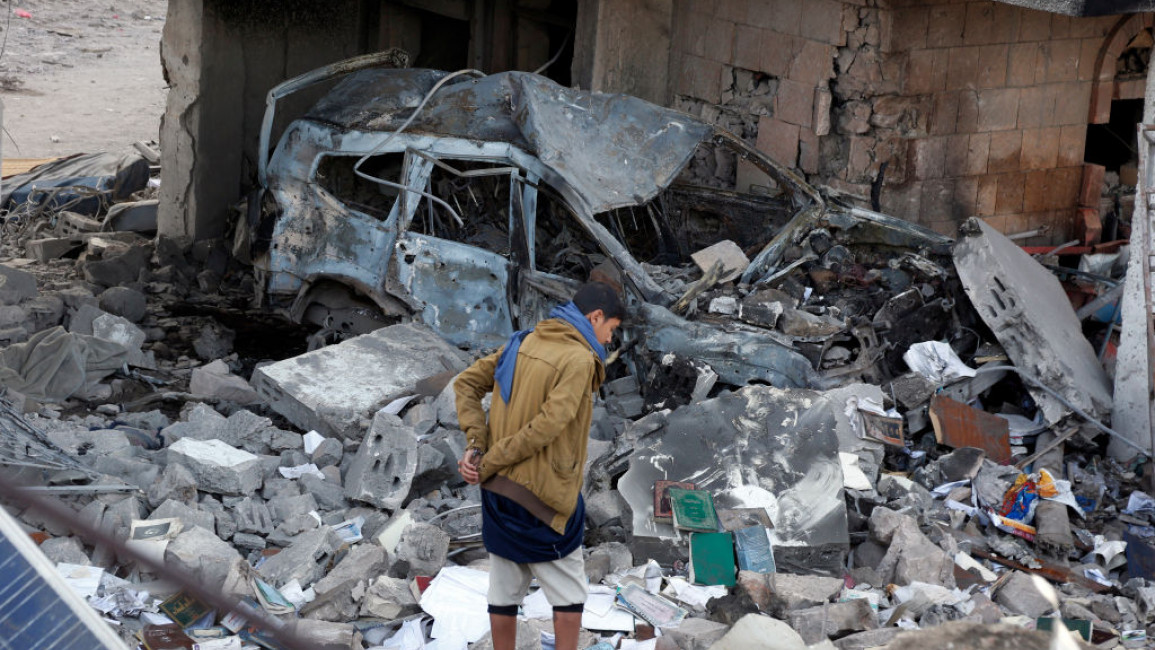At least 14 killed in Saudi-led bombing of Yemen following Houthi attack on Abu Dhabi
The Saudi-led coalition killed at least 14 people in airstrikes on Yemen's rebel-held capital, according to a medical source Tuesday, after an attack by Houthi insurgents on the United Arab Emirates which sent regional tensions soaring.
Sanaa residents were combing the rubble for survivors of the strikes that levelled two houses, hours after the Houthis killed three people Monday in a drone and missile attack on the UAE capital Abu Dhabi.
Houthi Brigadier General Abdullah Qassem al-Junaid, director of the rebels' air force academy, was killed along with family members, the rebels' Saba news agency said.
Coalition forces launched further strikes on Sanaa on Tuesday.
They claimed to have killed "80 terrorist elements" in the wake of the Houthi attack on the UAE, according to the official Saudi Press Agency (SPA).
"We carried out 17 targeting operations against the militia in Marib during the past 24 hours," SPA reported a coalition statement as saying.
The UAE, part of the Saudi-led coalition fighting the Iran-backed rebels, had vowed a tough response to Monday's attack, the first deadly assault acknowledged inside its borders and claimed by the Yemeni insurgents.
The attack on the renowned Middle East safe haven of the UAE opened a new front in the seven-year war and followed a surge in fighting in Yemen, including battles between the rebels and UAE-trained troops.
Crude prices soared to seven-year highs partly because of the Abu Dhabi attacks, which exploded fuel tanks near storage facilities of oil giant ADNOC. The Houthis later warned UAE residents to avoid "vital installations".
Yemen occupies a strategic position on the Red Sea, a vital conduit for oil from the resource-rich Gulf.
After the attacks, Saudi Arabia's de facto ruler, Crown Prince Mohammed bin Salman, and Abu Dhabi Crown Prince Mohammed bin Zayed agreed to "jointly stand up to these acts of aggression", UAE state media said.
But the deadly Saudi counter-strikes against the Houthis received harsh criticism from UN Secretary-General Antonio Guterres, who said he "deplores" the "numerous civilian casualties," his spokesperson Stephane Dujarric said.
Guterres "again calls upon all parties to exercise maximum restraint and prevent further escalation and intensification of the conflict," Dujarric added.
The UAE has demanded an emergency meeting of the UN Security Council.
"This illegal and alarming escalation is a further step in the Houthis' efforts to spread terrorism and chaos in our region," the UAE's ambassador to the UN, Lana Nusseibeh, said in a letter to the Security Council's president.
The United States pledged to hold the Houthis accountable, while Britain, France and the European Union also condemned the assault.
The targeting of Abu Dhabi followed intense clashes in Yemen, including advances by the UAE-trained Giants Brigade, who drove the rebels out of Shabwa province.
The defeat dealt a blow to the Houthis' months-long campaign to capture neighbouring Marib, the government's last stronghold in the north.
Earlier this month, the Houthis hijacked the UAE-flagged Rwabee in the Red Sea, charging that it was carrying military equipment - a claim disputed by the coalition and the UAE.
The ship's 11 international crew are being held captive.
Yemen's civil war began in 2014 when the Houthis seized the capital Sanaa, prompting Saudi-led forces to intervene to prop up the government the following year.
The conflict has been a catastrophe for millions of its citizens who fled their homes, with many on the brink of famine in what the UN calls the world's worst humanitarian crisis.
The UN has estimated the war killed 377,000 people by the end of 2021, both directly and indirectly through hunger and disease.
"There is no end in sight for the Yemen war," Elisabeth Kendall, a researcher at the University of Oxford told AFP.
"Rather, the conflict is escalating and new fronts are opening up, both domestically and now regionally."



